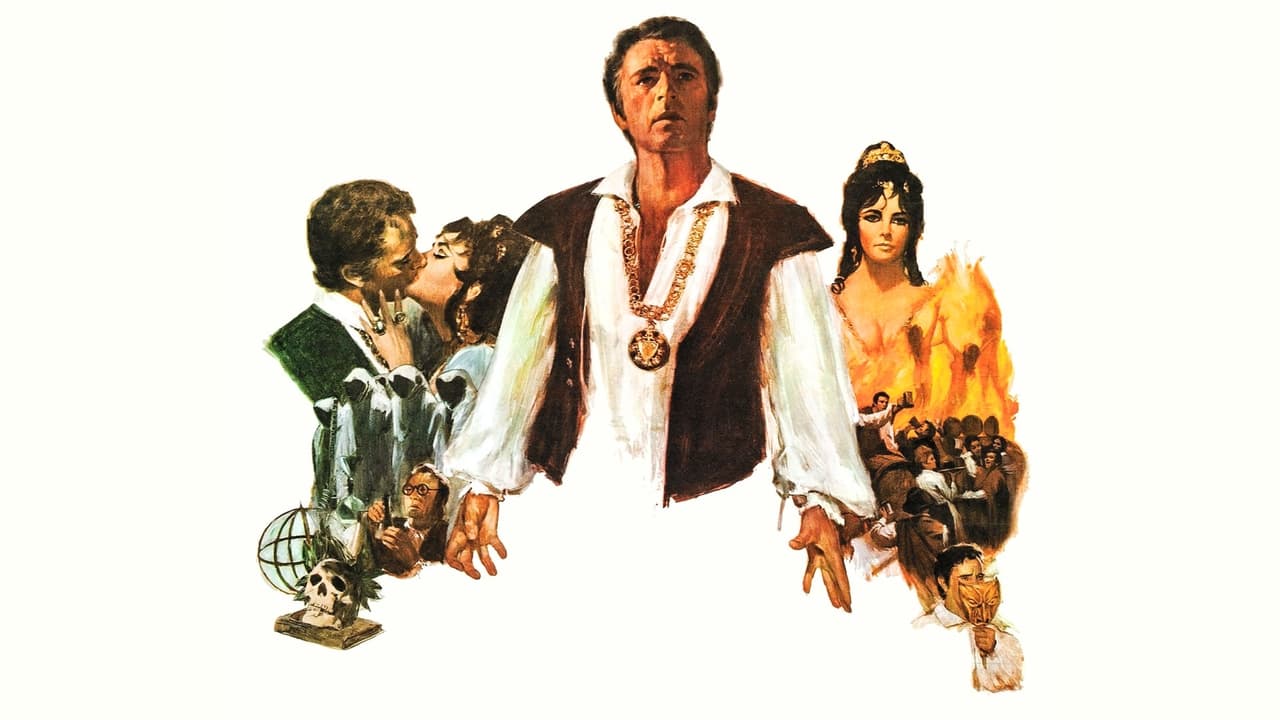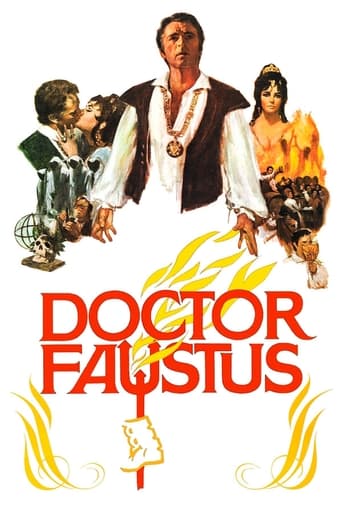

Don't ask me about the plot - I couldn't make heads nor tails of it. Rather than trying to decipher what they're saying (a surefire exercise in futility) watch this film only if you're intent on viewing the Burtons' every collaboration. This one competes with "Hammersmith Is Out" and "Boom" as the worst. Sets look recycled from Hammer Studio horror outings. Special effects are primitive and cheesy. Efforts to tie this 16th century gabfest to the swingin' sixties include throwing in some awkward nudity. On the plus side are Richard Burton's mellifluous voice and Elizabeth Taylor's still-beautiful face, captured here prior to the John Warner years, when she let herself go before re-emerging in the 1980s surgically restored to her rightful place as the most beautiful woman ever to grace the silver screen.
... View MoreI'll never forget the review of this particular movie that I read in the N.Y. Times many years ago: "Ye Gods and little fishes, break out the gin for this one!" Now that I've finally gotten a chance to see it, I know exactly what they meant. I suppose the production of this film was intended to answer a question on the minds of many film-goers and gossip-column readers in the late 1960s; namely, what can the most famous and notorious couple in pictures possibly do to top "Who's Afraid of Virginia Woolf?". The answer: "Doctor Faustus". In this film Richard Burton barters away his immortal soul to Lucifer for a roll in the hay with Elizabeth Taylor. Top that for an ego trip!Admittedly, this film also includes a great deal of plummy Elizabethan language, and plenty of lurid, pseudo-psychedelic special effects. However, most of the movie consists of Dick spouting reams of incomprehensible gibberish (in both Latin and English) in that incomparable voice of his, and drooling, literally, over Liz. Liz actually had the much easier role in this movie. She wasn't required to recite a single line of dialog. All she had to do was simply stand there and BE, the effect of which was to seemingly mesmerize every male actor in sight. Come on, what actress wouldn't give anything for a role like that? And for the piece de resistance, at the end of the movie Liz, laughing maniacally, gets to drag Dick, kicking and screaming, down to Hell for his well-deserved reward. What wife wouldn't have a ball playing a scene like that with her husband? By that point in the movie, anyone who isn't rolling in the isles with laughter simply has no sense of humor!
... View MoreShortly after I picked up a copy of Marlowe's play, I spotted the film in a video store. Having read the play first, I wondered how the film would portray it.It did pretty well. The film apparently wasn't a high-budget item, but it conveyed the essence of the play. And, as important, it used the basic Marlowe play. That adds a touch that a more "modernized" film wouldn't have. In that, it shares a legacy found in many Shakespearean films.The Faust story is well enough known so that there are no plot twist surprises. It may not be for everyone, but it's worth a view. Richard Burton makes a fairly believable Faust.
... View MoreThe movie did draw in sizeable audiences in the Philippines although most of those who saw it were disappointed including the critics. I remember one shallow critic lamenting the baring of Elizabeth Taylor in one fleeting scene (rear view). He wished she had done it in her earlier years when she would have been more attractive. I must admit that at my age then of 17, she did look a bit too mature for me. But seeing her again on video with me pushing 50, I found that she looks great.I not only saw the movie, I acted in our school play albeit in a small role as one of the scholars who spoke with Faustus. Alas! the play did not open as our director resigned after he couldn't pull off the open arena presentation he envisioned. Blocking was such a problem.Seriously, the cinematic effects achieved by Burton who was both actor and director, deserve kudos considering the technical limitations of special effects at the time (1967). A striking scene was when he and Mephistopheles were walking in the night heavens discussing hell. They didn't look superimposed at all and on the full screen, with the two figures seeming to walk on the bottom of the frame across the blue black firmament among the stars, it gave one a feeling of both wonder and terror of being lost in the heavens. Looking back, it seems that Burton pioneered in achieving a surreal LSD effect which later became quite common. The lines of Mephistopheles describing the nature of hell is memorable. I quote him freely: "Think you not that I who had experienced the Beatific Presence am not constantly tortured since I have been deprived of it? Hell is where we (the devils) are and where hell is, there we are, for each of us carry our own hell." This would apply to humans and not only to devils. The Oxford players were great especially the actor who played Mephistopheles who was portrayed sympathetically in that he seemed to regret the Faust's loss of his immortal soul. The devil was shown weeping.
... View More